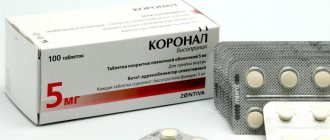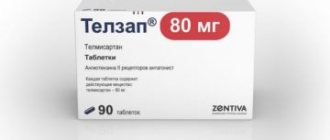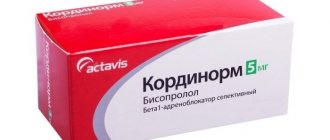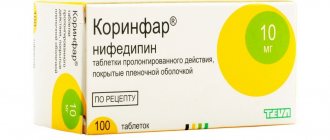Medicines based on calcium channel blockers have shown positive results in long-term therapy. Corinfar retard showed himself to be excellent. It appeared in the register of medicines a long time ago. It has a prolonged effect compared to other drugs, the key substance in which is nifedipine.
This article provides detailed information about Corinfar retard - instructions for use, at what pressure it is prescribed, and how to take these tablets.
Composition of Corinfar Retard
The main substance is Nifedipine. One tablet of Corinfar retard contains twenty milligrams of it. The composition also contains a small amount of excipients, such as povidone K25, potato starch, and also contains a small amount of lactose monohydrate, magnesium stearate and microcrystalline cellulose. The shell contains macrogol 6 thousand, quinoline yellow dye, macrogol 35 thousand, talc and titanium dioxide.
Externally, the tablets look like this:
- biconvex;
- coating - yellow film shell;
- homogeneous mass of yellow color at the fracture.
How is it different from the regular drug Corinfar?
What beneficial properties does Corinfar retard have? Instructions for use indicate that the method of use and dose are determined individually by the attending physician. It is classified as a synthetic substance that blocks calcium ion channels. Its use reduces atherosclerotic damage to the walls of coronary vessels.
The drug Corinfar retard has a slight effect of natriuresis - the release of sodium from the human body along with urine. Wherein:
- the fluid level in the vascular bed decreases;
- the load on the heart muscle is reduced.
The active substance, in addition to influencing the general tone of the arteries and veins, has an effect on the kidneys, reducing blood pressure. This occurs due to dilation of the kidney vessels, leveling hypoxia.
Medicines whose names contain the word “retard” are long-acting drugs. They last longer because the active ingredients in the tablet are released gradually.
When blood pressure rises, it can be lowered faster than necessary using conventional means. With high blood pressure, a person in panic can take two tablets at once, adding an auxiliary medicine to be safe. As a result, after a short time, blood pressure drops too low. This can trigger a myocardial infarction or stroke.
To stabilize pressure more smoothly, Corinfar retard is used for treatment (indications for use: prolonged normalization of blood pressure).
Thanks to this drug, pharmacological substances penetrate the body very slowly. It begins to act later, but is able to withstand increased pressure for a longer time.
Side effects
Usually the drug is well tolerated by patients. A common side effect is headache.
You may also experience:
- Allergic reactions to the active substance and auxiliary components. Manifestations: skin rash with itching, urticaria, eczema, skin sensitivity to the sun (photodermatitis), anaphylactic shock, bronchospasm.
- From the heart and blood vessels: heart rhythm disturbances (tachycardia, bradycardia), rapid heartbeat, swelling in the legs, flushing of the face, significant decrease in blood pressure, loss of consciousness.
- From the central nervous system: depression, headache, constant fatigue, weakness, dizziness, drowsiness. With long-term use of nifedipine, tremors, difficulty swallowing, shuffling, and muscle weakness may develop.
- From the digestive system: stool disorders (constipation, diarrhea), nausea, dry mouth, increased appetite. In rare cases, gum hyperplasia develops, which disappears without a trace after discontinuation of the drug. In case of long-term use of the drug, liver function may be impaired.
- Changes in blood composition: decreased levels of hemoglobin, leukocytes, granulocytes or platelets in the blood.
- From the excretory system: in the first weeks of use, an increase in the daily amount of urine is observed. In patients with kidney disease, their function deteriorates.
- The following may also occur: joint inflammation, swelling, temporary blurred vision due to a high concentration of nifedipine in the blood, weight gain, gynecomastia, and increased blood glucose levels.
Contraindications and application features
Corinfar retard is not used:
In case of individual intolerance to the components of the product.- In case of acute heart attack (first month).
- Pregnant women in the first 12 weeks.
- Nursing.
- Hypotension. Reduced blood pressure.
- Unstable angina.
- Cardiogenic shock.
- Aortic stenosis.
Elderly people and patients with severe forms of renal, hepatic or heart failure should be under medical supervision if necessary to use the drug. Corinfar retard is also prescribed with caution to children and adolescents under 18 years of age, to patients with intestinal obstruction, cerebrovascular accidents or heart rhythm disorders.
In some cases, when starting to take the drug or when increasing the dose, patients experience angina attacks. You need to see a doctor to change the medication.
You cannot combine taking nifedipine with drinking alcoholic beverages.
If general anesthesia is necessary, you should inform your doctor about taking the drug Corinfar retard.
Grapefruits and grapefruit juice weaken the effect of the drug.
At the beginning of treatment, you should not drive a car. It is necessary to monitor the body's reaction to the drug.
During pregnancy and lactation
Nifedipine passes into breast milk and passes through the placental barrier. It is not recommended to prescribe the drug during pregnancy and lactation.
It is forbidden to use in the first trimester. In the second and third - at the discretion of the doctor.
Overdose
In case of an overdose of the drug, symptoms of intoxication are observed: loss of consciousness, coma, severe decrease in blood pressure, heart rhythm disturbances, low oxygen content in the blood, pulmonary edema.
Therapy is aimed at removing nifedipine from the body and restoring normal functioning of the body. First of all, you should rinse your stomach and give an enema. Seek medical help. Further treatment is symptomatic.
Video: “What are beta blockers?”
Indications
It is advisable to use Corinfar retard for:
- exertional angina (stable angina);
- essential arterial hypertension;
- angiospastic angina (variant angina, Prinzmetal's angina);
- coronary heart disease.
Causes and symptoms of high blood pressure
At what pressure is it used?
The medicine is used for high blood pressure. It stops attacks of arterial hypertension and coronary heart disease. It has a slow, long-lasting effect.
This effect is achieved due to the presence of nifedipine, a calcium channel blocker, in the drug. The use of Corinfar retard leads to the expansion of peripheral vessels and coronary arteries in the body. This occurs due to the fact that the calcium concentration inside smooth muscle cells decreases. This leads to a decrease in impulse transmission at the intracellular level.
The drug is taken in a course to stabilize blood pressure as prescribed by a doctor. In emergency cases, it can be used to relieve a crisis. Blood pressure levels at which it is advisable to use the drug are individual for each person. Since the effect of a long-acting drug appears gradually, daily administration is required to achieve a significant reduction in blood pressure.
Overdose
If for any reason the dosage of the drug is exceeded, this fact can be identified by the following symptoms:
- headache;
- facial skin hyperemia;
- prolonged and pronounced decrease in pressure;
- depressed sinus node function;
- bradycardia or tachycardia;
- bradyarrhythmia.
In severe cases, there is a risk of loss of consciousness and coma. In case of overdose, symptomatic therapy is carried out. It includes the following measures:
- If the poisoning is severe, then gastric lavage is required, and in some cases, the small intestine. After this procedure, you must take an adsorbent. Usually they get by with activated carbon.
- Corinfar retard has antidotes as calcium preparations. The patient is given intravenous calcium chloride or calcium gluconate. Then the selected drug is administered by infusion.
- If the pressure is significantly reduced, then dobutamine, dopamine or epinephrine or norepinephrine are administered intravenously.
- When heart failure develops, strophanthin is administered intravenously.
- If conductivity is impaired, then resort to atropine and isoprenaline. In some cases, an artificial pacemaker is necessary.
- Due to the ineffectiveness of hemodialysis, plasmapheresis is used.
In case of overdose, glucose and electrolytes should be monitored. If a patient is on hemodialysis and has malignant hypertension or irreversible renal failure, then he requires increased attention. Vasodilation in this case can lead to a significant drop in pressure.
Can it be used to quickly lower blood pressure?
Considering that this medicine has a prolonged effect, it is still better to use other tablets to quickly lower blood pressure. For example, ordinary Corinfar can reduce blood pressure in 10 minutes. If there is nothing else at hand at the time of the jump, it is possible to use its prolonged substitute.
It should be borne in mind that a sharp decrease in pressure in itself is stress for the cardiovascular system. Patients should receive comprehensive therapy aimed at preventing a rise in blood pressure, limit physical and mental stress that provokes a rise in blood pressure, and not lower the pressure.
Instructions for use
Corinfar retard, unlike other products containing nefidipine, has its own specific rules for administration. In the vast majority of cases, this medicine is prescribed by a doctor with the condition of taking one tablet 2 times a day (depending on the dosage).
How to use?
The dose is prescribed individually for each person. In order for the prolonged effect to fully manifest itself, the tablets must be taken after meals and washed down with large quantities of water.
Only a specialist has the right to determine the duration of one course according to laboratory test data. Application in most cases comes down to taking one tablet twice a day at regular intervals (12 hours).
Dosage
Depends on the symptoms and their intensity. It is determined by a doctor on an individual basis. The average amount of medication prescribed is 2 times a day, 20 milligrams each. If the goals of therapy cannot be achieved with a dosage of Corinfar retard 20 mg, the instructions allow you to increase the dose to 40 mg twice a day (i.e. 80 mg per day).
Important clarification: between doses of Corinfar Retard there should be a gap of 4 hours if the doctor prescribes triple use, and 12 hours - if used twice.
special instructions
Patients who are prescribed Corinfar retard for the first time, especially older people, should be especially careful if they have:
- chronic heart failure (decompensation phase);
- severe arterial hypotension with systolic blood pressure not exceeding 90 millimeters of mercury.
When discontinuing the drug, the number of tablets taken per day should be reduced gradually. Otherwise, sudden cessation of use may cause a sudden development of unwanted symptoms. Especially if the patient has been taking the drug for several months. In this case, blood pressure may increase and lead to myocardial malnutrition.
Also, do not forget that:
- It is not advisable to take tablets with alcohol. This can lead to excessive slowing of conditioned reflexes against the background of a sharp decrease in blood pressure.
- If liver function is impaired, these tablets should be prescribed to the patient with great caution and after careful medical supervision. Then control over the dosage is necessary.
- If the patient has impaired renal function, as well as irreversible renal failure and patients on hemodialysis, you should also take it with caution, as a sharp uncontrolled decrease in blood pressure is possible.
If renal function is impaired, special care must be taken when prescribing Corinfar retard. This applies to patients with hypovolemia and irreversible renal failure who are on hemodialysis (high risk that blood pressure will drop too sharply).
Corinfar retard has virtually no clinical experience of use in pediatrics, therefore, as a rule, it is never prescribed for the treatment of children.
At the very beginning of treatment, you should refrain from driving a car or other vehicles, because reduced blood pressure can cause inhibition of the speed of various psychomotor reactions. After long-term use, you should still drive with caution.
Contraindications
Corinfar retard is prohibited for patients who cannot tolerate nifedipine, other dihydropyridine derivatives, as well as any other component of the composition. The medicine is also contraindicated in the case of:
- hypotension (up to 90 mm Hg in systole);
- collapse;
- cardiogenic shock;
- severe aortic stenosis;
- decompensated chronic heart failure;
- unstable angina;
- acute myocardial infarction;
- I trimester of pregnancy;
- breastfeeding;
- concomitant use of rifampicin.
There are also a number of situations when you need to take this medicine with caution. This applies to:
- childhood and adolescence;
- II and III trimesters of pregnancy;
- pronounced narrowing of the lumen in the mitral valve;
- hypertrophic obstructive cardiomyopathy;
- sinus node dysfunction;
- severe bradycardia or tachycardia;
- malignant hypertension;
- severe circulatory disorders;
- myocardial infarction with left ventricular failure;
- renal or liver failure;
- gastrointestinal obstruction;
- hemodialysis;
- combinations with β-blockers, digoxin;
- hypovolemia.
Patient reviews
Judging by the reviews of patients, we can conclude about the advantages and disadvantages.
As an advantage, many patients cite the fact that only this drug helps them, since it very smoothly reduces blood pressure compared to other medications containing nefidipine. It is this quality that made Corinfar retard so popular. It is especially convenient for those who experience frequent increases in blood pressure before bed.
Among the disadvantages of this medication, patients note migraines as a side effect, due to which in some cases it is necessary to use painkillers. It has been noted that drugs taken with caffeine (for example, citramon) have a negative effect. Therefore, it is recommended to replace them with aspirin or paracetamol.
Many people say that they used the tablets sublingually (put them under the tongue), which helped them a lot.
Very rarely, patients indicate nausea, vomiting and dizziness as side effects.
Interaction with other drugs
Antihypertensive drugs, as well as tricyclic antidepressants, nitrates, ranitidine and cimetidine, when used simultaneously, enhance the effects of the drug
With the simultaneous use of nifedipine and beta-blockers, the risk of developing arterial hypotension and the development of symptoms of circulatory failure increases.
When used simultaneously, the drug reduces the concentration of quinidine in the blood.
With simultaneous use, nifedipine increases plasma concentrations of theophylline and digoxin.
When using Corinfar simultaneously with other drugs, possible interaction reactions should be taken into account:
- Nitrates – increased tachycardia;
- Diltiazem – suppression of nifedipine metabolism;
- Rifampicin – acceleration of nifedipine metabolism;
- Prazosin and other alpha-blockers - suppression of their metabolism, enhanced hypotensive effect;
- Vincristine – slowing down its elimination and, as a result, increasing side effects;
- Amiodarone, quinidine, disopyramide, flecainamide - increased inotropic effect;
- Quinidine – decrease in its concentration in blood plasma;
- Cephalosporins, digoxin, theophylline - increase in their concentration in the blood;
- Lithium preparations – increased toxic effects (diarrhea, nausea, vomiting, ataxia, tinnitus, tremor);
- Procainamide, quinidine and other drugs that cause QT prolongation - risk of significant prolongation of the QT interval;
- Nonsteroidal anti-inflammatory drugs (NSAIDs), sympathomimetics, estrogens – decreased hypotensive effect;
- Inhibitors of the CYP3A isoenzyme, including antiviral drugs (for example, nelfinavir, indinavir, ritonavir, saquinavir, amprenavir), azole antifungals (fluconazole, itraconazole, ketoconazole), valproic acid, macrolides - increase the concentration of nifedipine in the blood plasma;
- Drugs with a high degree of protein binding, including indirect anticoagulants - derivatives of indanedione and coumarin, NSAIDs, salicylates, anticonvulsants, quinine, sulfinpyrazone - increasing their concentration in the blood plasma;
- Other antihypertensive drugs, nitrates, inhalational anesthetics, tricyclic antidepressants, diuretics, cimetidine - increased hypotensive effect of nifedipine;
- Carbamazepine, phenobarbital – decrease in the concentration of nifedipine in the blood plasma.
Caution is required when treating Corinfar simultaneously with the following drugs:
- Disopyramide and flecainamide: may enhance the inotropic effect;
- Nitrates, tricyclic antidepressants, antihypertensives, diuretics, inhalational anesthetics, cimetidine: can enhance the hypotensive effect of nifedipine, and nitrates also increase tachycardia;
- Diltiazem: interferes with the metabolism of nifedipine in the body, and rifampicin accelerates it (combined use is contraindicated);
- Estrogens, nonsteroidal anti-inflammatory drugs (NSAIDs), sympathomimetics: reduce the hypotensive effect;
- Lithium preparations: may lead to increased toxic effects such as nausea, diarrhea, vomiting, tremor, ataxia, tinnitus;
- Quinidine, procainamide and other drugs that cause QT prolongation: increase the risk of significant prolongation of the QT interval;
- Grapefruit juice: interferes with the metabolism of nifedipine, therefore its use during therapy is contraindicated;
- Macrolides, antifungal drugs of the azole group (ketoconazole, itraconazole, fluconazole), antiviral drugs (indinavir, amprenavir, nelfinavir, saquinavir, ritonavir), valproic acid: increase the concentration of nifedipine in the blood plasma, and carbamazepine and phenobarbital decrease it.
It should also be taken into account that when co-prescribing Corinfar:
- Strengthens the negative inotropic effect of quinidine and amiodarone;
- Increases the plasma concentration of drugs such as: theophylline, digoxin, NSAIDs, salicylates, quinine, cephalosporins (cefixime), anticonvulsants, sulfinpyrazone, indirect anticoagulants: indandione and coumarin derivatives;
- Helps increase the adverse reactions of vincristine, inhibiting its elimination from the body (if necessary, reduce the dose);
- Increases the hypotensive effect, suppresses the metabolism of prazosin and other alpha-blockers.
Analogs
Several dozen medications have a similar composition with the required Nifedipine content. Most of them are similar in name. This allows you to independently select analogues that replace Corinfar retard if the required medicine is not available in the pharmacy. Doctors strongly recommend not to do this, but if there is no choice, then it is better to know in advance how to find a replacement:
- Cordaflex;
- Nifedipine (Stada);
- Nifecard HL;
- Calcigard retard.











